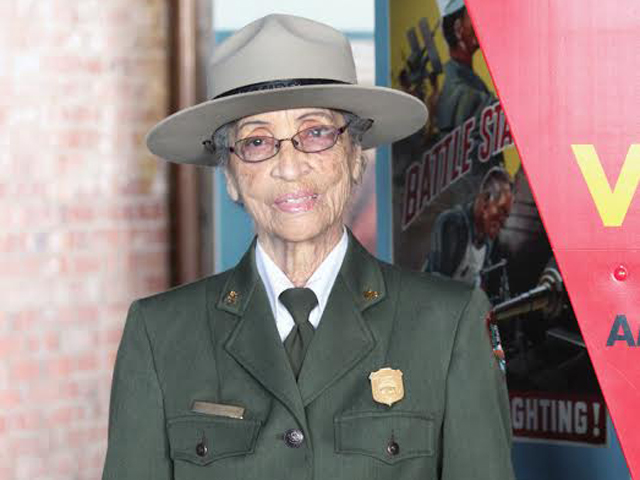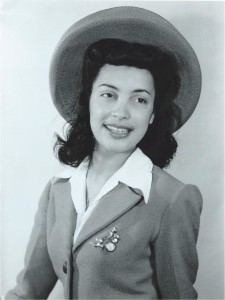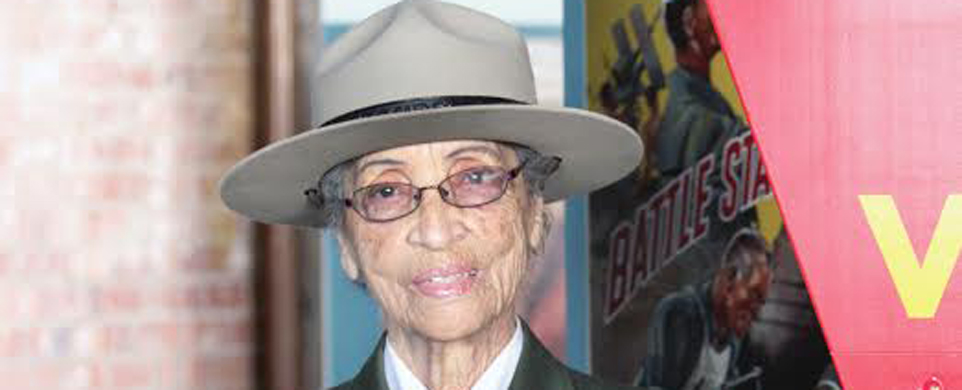
At nearly 95, Betty Reid Soskin has lived a remarkable life, but her adventures are not over.
During World War II, when Soskin was 20, she worked as a file clerk for Boilermakers Union A-36, a Jim Crow segregated union. In 1945, she and her first husband, founded Reid Records, a small record store specializing in Gospel music. In the 1960’s she enjoyed writing songs and performing them at college campuses during the Civil Rights Movement. In the late 1970’s she became a community activist and started serving as a field representative for California State Assemblywoman Dion Aroner and Loni Hancock.
It was through this civic work, which led Soskin to become involved in the planning of a park to honor the active role of women during World War II, a role she knew of first-hand. For the past decade, she has been working in that very park – Rosie the Riveter/World War II Home Front National Historical Park – located in her hometown of Richmond, California.
“I didn’t become a ranger until I was 85,” says Soskin, who is considered the most senior park ranger in the entire U.S. “I think most of what moves me is the park that I’m involved with is part of my living history. I’m a primary source.”
Soskin works five hours a day, five days a week, in the park’s Visitor Center.
“I work at the desk answering phones…On Tuesdays, Thursdays, Saturdays, I screen one of our nine films and then do a commentary,” she says. “On Wednesdays and Fridays, I work on writing, answering mail, catching up with my e-mail, and am involved in planning meetings with the rest of the staff.”
She’s proud that she played such an active role in the development of Rosie the Riveter National Park, and gets to continually do so every week.
“I get to add the history of African American women,” says Soskin. “The park wasn’t meant to celebrate that part of history…History that’s not in the history books.”
She says the first people were who were hired to work in the World War II effort were men too old to fight, then single white women, then when that pool was exhausted, they hired married white women, then black men.

“Then in 1944-45, they began to train black women to be welders,” recalls Soskin. “I was working in a segregated union hall making 5×5 change of address cards for people who were constantly moving.”
She says her history was very different from that of Rosie the Riveter – a cultural icon representing the American women who worked in factories and shipyards during World War II, many of whom worked in the shipyards and factories making war supplies.
“I get to trace that history for people,” says Soskin, about her work. “It was a case of being involved in one of the most dynamic histories in our time…and I can make it come alive for people.”
Her favorite moment in history took place on January 20, 2009.
“I was a seated guest at the Capitol, and I had a picture of my great grandmother – who had been a slave – in my pocket, and the first black President was being inaugurated. I don’t think she could’ve imagined that happen in the world she lived in. I don’t think she could think that could happen. We are living in such a fast changing world. It’s absolutely unbelievable.”
As far as the current elections and race relations, she says we didn’t come so far in one piece.
“A lot of us got stuck,” says Soskin. “When I was a young woman, my father was a craftsman, and my grandfather was an engineer. We lost in everything in the 1927 floods in New Orleans, and my father lost his status in that world.”
It was not possible for him to be a craftsman in the west coast, so he started working on the railroad – he worked in the sandwich car.
“He was a very proud man, and I think being on that level must have been very, very hard for him,” says Soskin.
She continues to say that she feels that every event in her life was leading to the place she is now.
“I seem to be using everything I’ve ever learned, now, in this context,” says Soskin. “It’s an amazing place in life. I’m still an evolving person, still now. If I were to choose a favorite period, I think it would be the last 10 years.”
During the last 10 years, she’s worn her uniform proudly.
“I enjoy wearing my uniform, because I’ve seen little girls look up at me and wonder,” says Soskin. “It does give the silent message that this could be a career option that they might not have thought of.”
The piece of advice she would have liked to have given her younger self:
“Don’t get hung up on the answers. It’s the questions that lead you through life,” she says. “Answers have always been temporary for me. As I aged, if I found an answer, I knew they would never last – they developed into new questions. No one lifetime can encompass all those answers. That is still where I am.”
